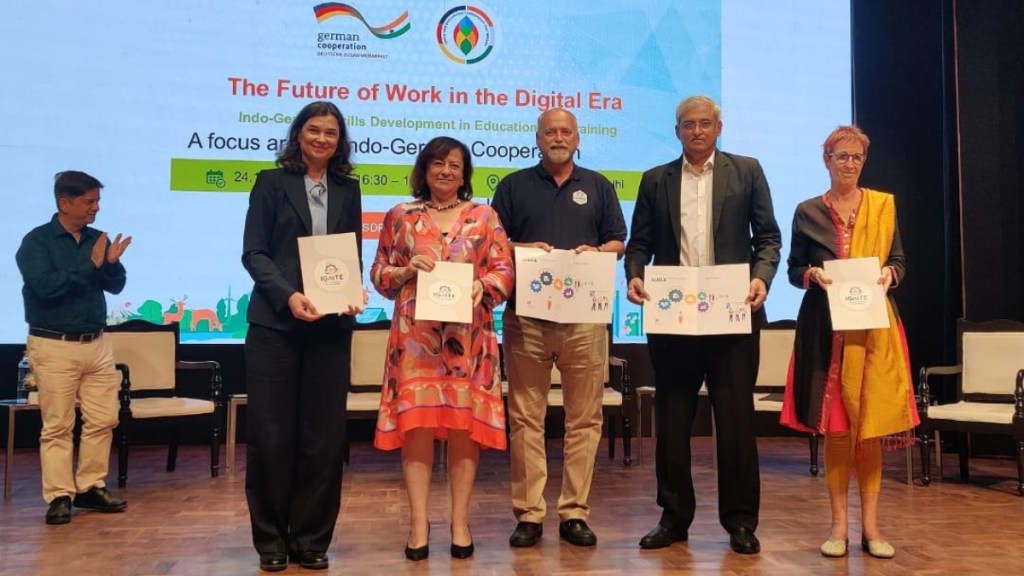As part of the ongoing Indo-German government consultations between Chancellor Olaf Scholz and Prime Minister Narendra Modi, which are currently taking place from October 25-26, a key focus is on the expansion of the Migration and Mobility Agreement. This development is expected to further strengthen collaboration in mobility and skill development, paving the way for enhanced workforce readiness in both nations.
In alignment with this, Germany’s strategic partnership with India has been crucial for fostering development cooperation, particularly in areas like education and vocational training. As outlined in a recent focus paper, the first of its kind brought out by Germany for any country, Europe’s economic powerhouse has placed significant emphasis on supporting India’s skilled workforce through expanded immigration pathways, education exchange, and vocational training initiatives. The expansion of the Migration and Mobility Agreement will be a key enabler of these initiatives, facilitating the flow of skilled labour and technical expertise between the two countries as part of a broader effort to meet the demands of the digital and green economies.
On the sidelines of these discussions, the German Embassy in New Delhi, along with Siemens Stiftung, is leading the charge in advancing educational and skill-based cooperation through two major initiatives that focus on preparing India’s youth for a digital and sustainable future.
Shaping the Future Workforce through Collaboration
In parallel, the German Embassy in New Delhi hosted the fifth episode of the Green and Sustainable Development Partnership (GSDP) Conversation Series, focusing on “The Future of Work in the Digital Era: Indo-German Skills Development in Education and Training.” This event provided a platform for experts from academia, industry, and government to discuss the future of work and the importance of equipping the workforce with digital and green skills to meet the evolving demands of the global labour market.
GSDP Conversation Series: Building the Workforce of Tomorrow
The GSDP Conversation Series, launched under the Indo-German Partnership for Green and Sustainable Development, has emerged as a vital dialogue platform for shaping the future of bilateral cooperation. At the IIT Delhi event, discussions centered on how India and Germany can jointly address the challenges of digitalization, automation, and sustainability by building a workforce prepared for tomorrow.
Key speakers included Dr. Bärbel Kofler, Parliamentary State Secretary from the German Federal Ministry for Economic Cooperation and Development (BMZ), who emphasized the importance of collaboration in education and technology. “To achieve our common global goals, including the Sustainable Development Goals (SDGs), we must invest in future generations, combining education, technology, and sustainability,” she noted.
The event underscored the need for industry-academia collaboration to address the rising demand for skills in fields such as Artificial Intelligence (AI) and green technologies. Prof. Chetan Arora from IIT Delhi’s Department of Computer Science and Engineering highlighted the potential of AI to revolutionize education and healthcare in India, offering scalable solutions for personalized learning.
Experimento India: Bridging the Digital Learning Divide
In conjunction with these efforts, Siemens Stiftung, Siemens Limited, and Pratham Education Foundation launched the “STEM Education for Innovation: Experimento India” project, aimed at improving STEM education for students from low-income communities. The initiative, which aligns with India’s National Curriculum Framework, offers Open Educational Resources (OER) and integrates with Siemens Limited’s Project Jigyaasa to provide digital learning tools in over 170 government schools across India.
Dr. Nina Smidt, Director of Siemens Stiftung, emphasized the importance of providing localized learning materials in Indian languages to break down barriers to education. “The digital era, particularly AI, is a reality. The question now is how to provide access to it equitably,” she stated.
A Pathway for Future Cooperation
These initiatives are seen as significant steps forward in addressing global challenges like digitalization and climate change. As India and Germany continue their consultations, the expansion of the Migration and Mobility Agreement is set to deepen their collaboration in skill development, creating new opportunities for both countries to build a future-ready workforce.



















